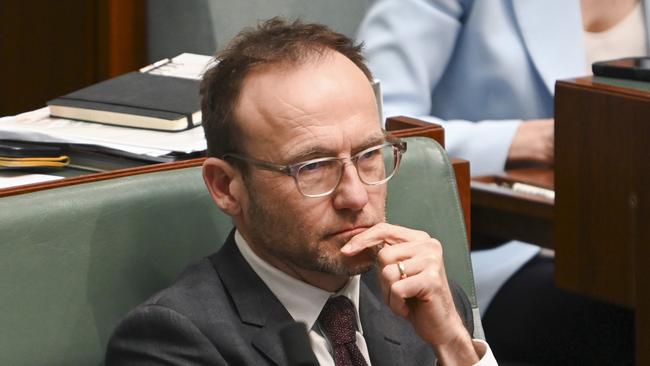Bills vote record: Greens and Adam Bandt accused of undermining national security
Adam Bandt has voted for just 6 per cent of government counter-terrorism and national security bills that went to a division during his 14 years in parliament, new research reveals.

Adam Bandt has voted for just 6 per cent of Labor and Coalition government counter-terrorism and national security bills that went to a division during his 14 years in parliament, prompting Liberal Party accusations the Greens have undermined Australia’s law enforcement efforts.
With polls showing the Greens leader could be a kingmaker after the federal election in the event of a hung parliament, new parliamentary library research also reveals the minor party supported 15 per cent of counter-terrorism and national security bills where a division was called in that time.
There have been at least 59 of these bills that passed the parliament since Mr Bandt was first elected in 2010 but 41 of them went through on the voices without any statement from the Greens leader or record of how he voted.
Of the 18 bills where his position was recorded, Mr Bandt voted for just one – a 2019 amendment to the Criminal Code under Scott Morrison that cracked down on tech giants for failing to remove abhorrent violent material from their platforms.
Bills he rejected included the Citizenship Repudiation Bill, which allows the home affairs minister to request a court order a person’s dual citizenship be revoked if they have been convicted of a serious offence.
Mr Bandt also opposed a 2016 amendment to the Criminal Code enabling the continued detention of high-risk terrorist offenders who a judge considers an unacceptable risk to the community at the end of their jail sentence.
There have been 39 counter-terrorism and national security bills that passed parliament where the position of the Greens party was recorded, according to the parliamentary library research, which was commissioned by opposition community safety and multicultural affairs spokesman Jason Wood.
Nineteen of the 59 government bills passed on the voices only.
The party voted for six bills – including one that enhanced the Inspector-General of Intelligence and Security’s oversight functions and powers – and against 33, such as a bill that extended certain counter terrorism powers of the Australian Federal Police.
The discrepancy between Mr Bandt’s voting record and that of his party is because he was either absent for a vote in the lower house or a bill passed on the voices in the House of Representatives and then went to a division in the Senate, where the Greens recorded their position.
The Coalition seized on the research to demand Anthony Albanese rule out any deal with the “increasingly extreme” Greens in order to form majority government that would water down Australia’s counter-terrorism laws designed to keep the community safe.

“Labor has done enough damage to community safety already; the last thing Australia needs is a weak Prime Minister doing deals with the extreme Greens on national security,” opposition home affairs spokesman James Paterson said.
Mr Wood said Australians needed to be aware of the Greens’ and its leader’s “shocking record of supporting law enforcement” ahead of the federal election, which is due by May.
“They’re no longer all about trees and the environment, it’s hardcore extremist activism and they’re more likely to go and support a terrorist organisation than defend the Australian public,” Mr Wood said, pointing to the attendance of Greens senators at pro-Palestinian rallies where Hezbollah flags were waved.
Greens sources said the figures referred to by the Liberals had no credibility, with Mr Bandt declaring “the Coalition’s calculations are utterly ridiculous, ignoring the many times bills passed without opposition”.
“In the instances the Greens voted against these bills we did so for good reasons, including that the bills let government access innocent people’s communications and help hackers get into your private data, let government arbitrarily strip people of citizenship, and authorise the ADF to use lethal force against its own citizens,” Mr Bandt said.
“The Greens position on Palestine is in accordance with the UN, the courts and international law,” he added.
A government spokesman said: “The government has prosecuted its national security agenda in spite of the Greens political party, and will continue to do so after the election.”
Government sources noted the Greens had been the main opposition party on national security bills under Labor and Coalition governments.
Peter Jennings, director of Strategic Analysis Australia, predicted the Greens had “simply gone too radical for the Australian electorate” after their recent election losses in the ACT and Queensland.
“The big factor driving this has been their support for the so-called Palestinian movement, which has aligned them way too closely with extremist groups sympathetic to terrorism,” Mr Jennings said.
“Other than for a tiny number of Australians, that is politically disastrous for the party.”
The parliamentary library said the research should be considered approximate only and may not be comprehensive as there could be other relevant legislation not captured in its work.



